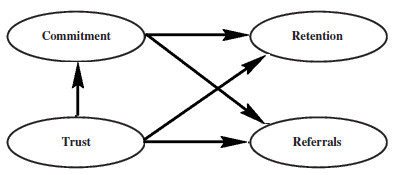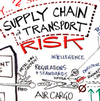 Obviously, selecting the right third-party logistics provider (3PL) for your supply chain is an important decision in supply chain risk management. Here, trust and commitment are two highly interrelated notions that stimulate and facilitate customer loyalty and a long-lasting buyer-supplier relationship that can contribute to mitigating logistics risks. However, customer (and supplier) loyalty is formed differently in different countries. That is at the core of Commitment and Trust as Drivers of Loyalty in Logistics Outsourcing Relationships: Cultural Differences Between the United States and Germany, written jointly by Carl Marcus Wallenburg, David L. Cahill, A. Michael Knemeyer, and Thomas J. Goldsby. Is 3PL outsourcing in Germany really that much different from 3PL outsourcing in the US?
Obviously, selecting the right third-party logistics provider (3PL) for your supply chain is an important decision in supply chain risk management. Here, trust and commitment are two highly interrelated notions that stimulate and facilitate customer loyalty and a long-lasting buyer-supplier relationship that can contribute to mitigating logistics risks. However, customer (and supplier) loyalty is formed differently in different countries. That is at the core of Commitment and Trust as Drivers of Loyalty in Logistics Outsourcing Relationships: Cultural Differences Between the United States and Germany, written jointly by Carl Marcus Wallenburg, David L. Cahill, A. Michael Knemeyer, and Thomas J. Goldsby. Is 3PL outsourcing in Germany really that much different from 3PL outsourcing in the US?
It may not be this simple
Although the authors test their model of loyalty formation on the basis of commitment and trust on as many as 795 logistics outsourcing relationships in the the US and Germany, they also caution that the results should by no means be generalized or accepted as facts about cultural traits and how business operates in these two countries. Life (and business life) is much more complicated than that. Nonetheless, the article does paint an interesting picture of how business relationships are formed in the US versus in Germany, and which elements that foster loyalty and which elements that don’t.
3PL – a risk manager
Logistics outsourcing is increasing and many companies depend on their 3PLs for managing their logistics risks, because after all, 3PLs are what makes supply chains move. This is reflected in my own on How Norwegian freight carriers handle transportation disruptions, where I found that
- Freight owners do not appear to be overly concerned about transportation disruptions, because both mitigative and contingent measures are handled by the freight carrier.
- Freight carriers are acutely aware of their important role in the overall supply chain.
- Freight owners seek vertical integration of one or several selected freight carriers into their supply chain, and are willing to pay a “risk premium” for securing on-time delivery.
- Freight carriers establish asset-specific and flexible solutions to meet the contingent needs of different freight owners.
Essentially then, it’s the third-party logistics providers who handle and manage supply chain risks and thus become risk orchestrators, as I eluded to in a previous post.
What is logistics outsourcing?
Back to the paper, the authors start out by saying that while logistics outsourcing has been identified as a key topic in contemporary logistics research , one of the difficulties faced by researchers in this area is the assortment of definitions used to describe the concept. In this study, then,
logistics outsourcing involves a relationship between a company and an LSP which, compared with basic logistics services, has more customized offerings, encompasses a broad number of service activities, is characterized by a long-term orientation, and, thus, has a rather strategic nature
As to what kind of services that a third-party logistics provider could offer vis-a-vis potential customers, this post on the flexibility of logistics providers has a very useful list, and although it focuses on service flexibility, this flexibility is integral to customization and long-term orientation.
USA versus Germany
Citing several renown works on national and cultural differences in their literature review, the authors conclude that in contrast to US Americans, Germans …
- … extend trust more readily, especially to in-group members
- … are more accepting of information sharing
- … dread change and innovation
- … adhere to rules and regulations more strictly
- … place higher emphasis on stable relationships
- … are more loyal toward relationships, especially with in-group members
- … seek consensus and try to avoid conflict
- … require personal bonding for maintaining long-term business relationships
- … place lower emphasis on immediate economic benefits
- … are rather long-term oriented
Having grown up in Germany, and sort of semi-German in my heart and soul, and having spent some time in the US, I would agree to some of the points above, but certainly not all. FYI, a more detailed comparison can be found in my post on How loyalty is formed in business in my blog at the Kinaxis Supply Chain Expert Community.
The model
The theory behind this article is that there are two dimensions to loyalty: retention and referrals, acting together as presumed below.

The questions to be investigated are how do trust and commitment influence the two dimensions of loyalty. On a related note, Trust, Risk and Control in Strategic Alliances is an interesting side topic.
The result
The results show a very diverging formation of loyalty in the US versus Germany. Commitment assumes a key role in the United States. While trust has no significant direct effect on retention and referrals, commitment has a strong direct effect on both dimensions of loyalty. In Germany, the effect of commitment on loyalty is substantial, yet significantly weaker than in the United States, while trust in Germany has a strong and significant direct effect on both loyalty dimensions. Interestingly, so the authors,
Germans seem to focus more on frictionless long-term relationships fostered by trust, because business relationships in Germany often are accompanied by personal relationships and mutual admittance of relationship partners to the respective in-groups. Americans, on the other hand, are comparatively impersonal in the business world and rather calculative. Therefore, trust as an expression of the quality of the interpersonal relationship between buyer and seller is usually able to stimulate loyalty in Germany, while it has no direct effect in the United States. Here, instead, trust has to create commitment before it fosters loyalty behavior.
So, now you know it, Germans and Americans are very different when it comes to forging business relationships. Really?
Reference
 Wallenburg, C., Cahill, D., Michael Knemeyer, A., & Goldsby, T. (2011). Commitment and Trust as Drivers of Loyalty in Logistics Outsourcing Relationships: Cultural Differences Between the United States and Germany Journal of Business Logistics, 32 (1), 83-98 DOI: 10.1111/j.2158-1592.2011.01008.x
Wallenburg, C., Cahill, D., Michael Knemeyer, A., & Goldsby, T. (2011). Commitment and Trust as Drivers of Loyalty in Logistics Outsourcing Relationships: Cultural Differences Between the United States and Germany Journal of Business Logistics, 32 (1), 83-98 DOI: 10.1111/j.2158-1592.2011.01008.x
Author links
- wikipedia.de: Carl Marcus Wallenburg
- indigopearl.eu: David L Cahill
- osu.edu: A Michael Knemeyer
- uky.edu: Thomas J Goldsby
Related links
- community.kinaxis.com: How loyalty is formed in business – USA versus Germany
Related Posts
- husdal.com: Challenges in 3PL
- husdal.com: Cooperative Strategy
Outsourcing Relationships: Cultural Differences Between the
United States and Germany












